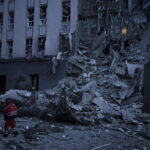
That was one of the conclusions reached by U.S. think tank Institute for the Study of War (ISW) in its most recent report, issued on Dec. 31.
In his New Year’s address, Putin once again declared 2022 as “a year of difficult, necessary decisions, of important steps toward achieving the full sovereignty of Russia and the powerful consolidation of our society.”
The Russian dictator went on to repeat the propaganda thesis about “the struggle and defense of our people on our own historical territories in the new Russian Federation Subjects (the illegally annexed territories of Ukraine).”
Read also: Russia’s Shoigu inspected occupied Crimea, not ‘forward positions,’ investigation shows
As ISW analysts noted, this speech continued Putin’s rhetorical claims not only that Russia has historical rights to Ukraine, but also that Russia’s independence and sovereignty depend on regaining control of Ukraine.
“These comments were likely meant in part to justify the costly war and to appeal to the ultra-nationalist pro-war community that routinely cites the defense of illegally annexed territories as reason to pursue even more aggressive goals and to pay even higher prices for them in Ukraine,” ISW analysts believe.
“They also indicate, however, that Putin remains unwilling to contemplate a meaningful peaceful resolution of the war he began – other than on terms he dictates to Ukraine and the West. Putin is unlikely to accept any lesser outcome unless Ukraine, with the help of its Western supporters, can inflict additional large-scale defeats on Russian forces and liberate considerably more of its occupied land.”
Read also: Russia to announce new wave of mobilization on Jan. 5 – Budanov
ISW also noted that Putin did not use his New Year’s Eve speech to clarify how the Russian military intends to reverse its setbacks in Ukraine and achieve its maximalist goals.
“The banality of most of the speech is consistent with previous ISW assessments that Vladimir Putin may have postponed his annual address to the Russian Federation Assembly because he was uncertain of his ability to shape the Russian information space amidst increasing criticism of his conduct of the war,” ISW concluded.
Read the original article on The New Voice of Ukraine




